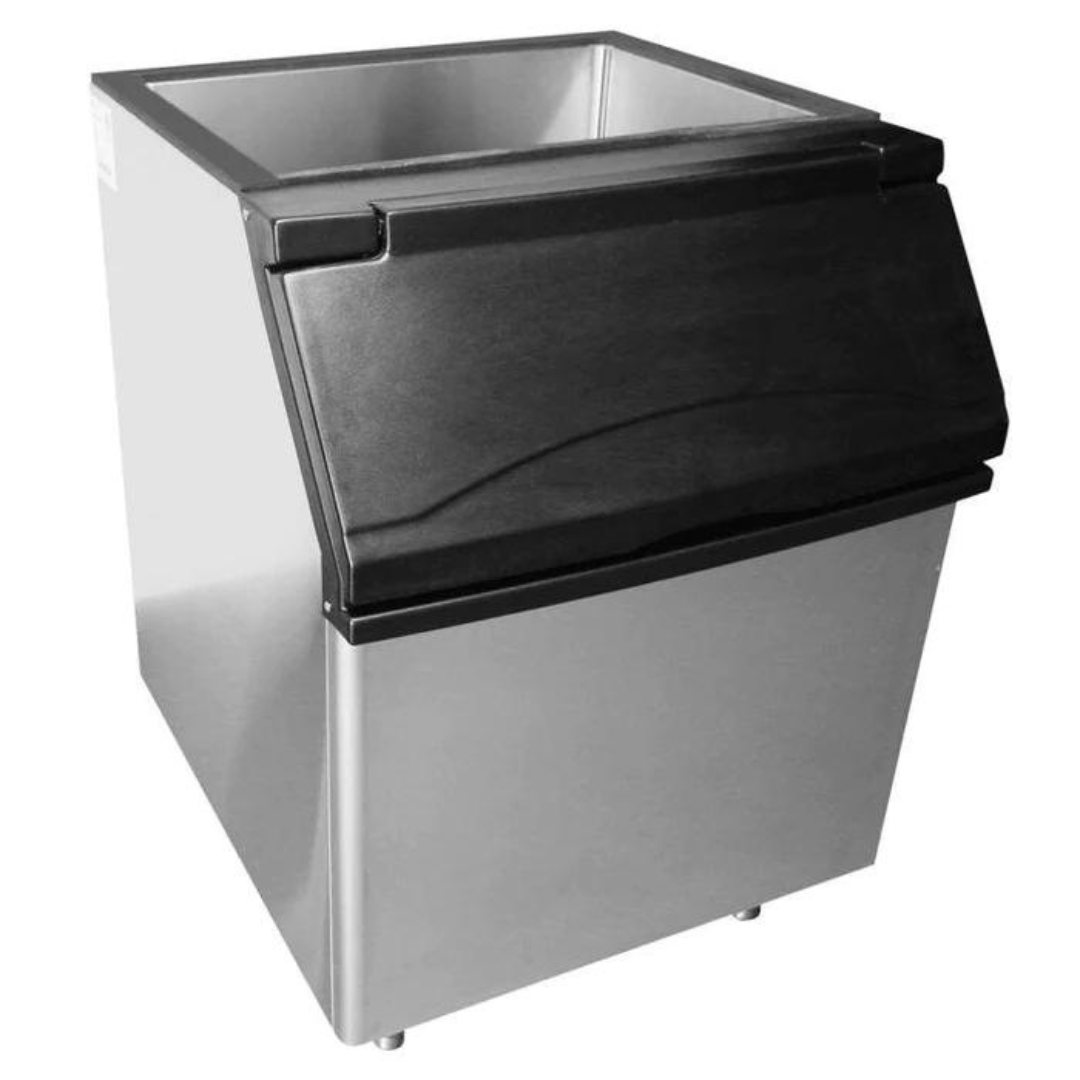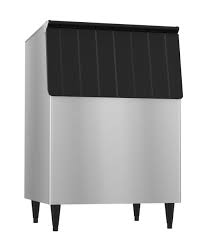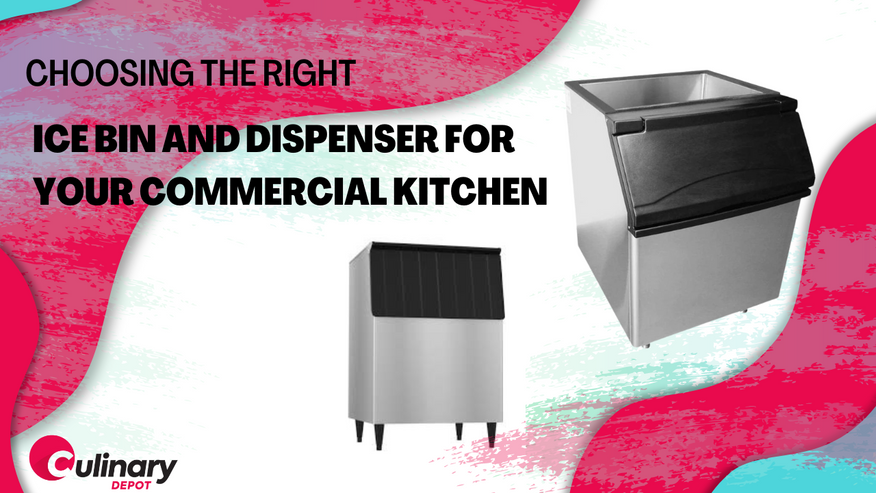Jul 14th 2023 - Team Member
Choosing the Right Ice Bin and Dispenser for Your Commercial Kitchen
Navigating the commercial kitchen landscape can be complex, especially when it comes to choosing specialized equipment like ice bins and dispensers. Selecting the right unit can greatly impact your establishment's efficiency, customer satisfaction, and bottom line.
This guide will explore these factors in-depth to ensure that your chosen ice bins fulfill your unique needs and support the efficiency and productivity of your establishment.
Understanding Your Needs

Before diving into the specifics of ice bins and dispensers, it's essential to assess your unique needs. Key factors to consider include your daily ice requirements and the available space in your commercial kitchen. If your establishment serves hundreds of drinks daily, you'll need a unit with high ice production capacity. Space constraints also play a pivotal role as your new equipment must fit within your existing layout.
How Ice Makers and Ice Storage Bins Work Together

It's essential to understand how an automatic ice maker and a bin work in unison to ensure your business has a steady supply of ice. Each ice machine has a production rating signifying how much ice it will produce over 24 hours under ideal temperatures. However, when temperatures rise above ideal conditions, the ice production rate falls. Recognizing this variability can help you select the most suitable Hoshizaki or Manitowoc ice bin for your business.
The ice maker drops the ice into an ice storage bin, which has a shut-off switch to prevent overflows. The capacity of the bin is determined by the maximum amount of ice it can hold when completely level, which usually forms a mound. Therefore, an ice bin will typically hold around 80% of its maximum capacity before triggering the switch and halting ice production.
How to Choose the Perfect Ice Bin
Selecting the right ice maker and bin begins with estimating your industry's average ice usage. It's essential to account for the places where you use ice, aside from serving drinks. Are there separate stations like a wait station where you keep ice? Do you use ice for food prep in the kitchen? These industry-specific questions should factor into your total ice usage.
Ice Bins & Dispensers: An Array of Choices
Modular Units
Modular units are large-scale appliances designed for high-volume ice production. Ideal for large establishments such as hotels or hospitals, these units can meet significant daily ice needs. However, they require ample space for installation and ventilation.
Undercounter Units
Undercounter ice machines are perfect for bars or small eateries where space is at a premium. While compact, they usually have a lower ice production capacity, which may not suffice for high-volume businesses.
Countertop Dispensers
Countertop ice dispensers offer easy access and are suitable for self-service areas in fast-food restaurants or office settings. The trade-off is the limited ice storage capacity.
Combination Ice Maker/Dispensers
For the ultimate convenience, combination ice makers/dispensers produce and dispense ice from a single unit. Ideal for healthcare facilities where ice is needed on-demand, these machines also save space but may have a higher upfront cost.
Location

If your ice machine will be installed in an area with hard-to-maintain temperatures, you should consider a model with more ice production to compensate for the drop in volume due to heat. You may also want to ensure that your establishment meets all the requirements to install an ice maker and bin, including sufficient drainage and space, appropriate electrical setups, and a capable ice maker water line.
Ice Types: A Crucial Consideration
Different types of ice cater to different needs. Cubed ice is durable and ideal for general beverage service. Nugget ice, also known as "chewable" ice, is softer and perfect for blended drinks. Flake ice is used primarily in food displays or therapeutic uses.
Bin Material and Insulation
The durability, insulation, and cleanliness of your ice bin largely depend on its material. Stainless steel is robust and easy to clean, while plastic bins can be lighter and more cost-effective. Whichever you choose, ensure the insulation is sufficient to prevent melting and conserve energy.
Maintaining Your Ice Bin and Dispenser
Regular maintenance and cleaning not only keep your machine running efficiently but also ensure sanitary ice. Your ice bin and dispenser should be cleaned and sanitized regularly, according to the manufacturer's instructions.
Cost and Energy Efficiency

Although energy-efficient models may have higher upfront costs, they can save money over time due to lower operational costs. When selecting an ice bin and dispenser, consider both the purchase price and the cost of running the machine.
Compliance with Health and Safety Regulations
Your ice bin and dispenser must meet local health department guidelines and food safety regulations. Look for models with certifications such as the NSF certification, which confirms that the product meets rigorous standards for public health protection.
Warranty and Service

Reliable warranties and prompt service options are vital when choosing an ice bin and dispenser. Remember, a breakdown can disrupt your operations, so ensure you have a service plan in place.
Brands and Reviews
Finally, consider the reputation of various brands and read customer reviews. Brands like Manitowoc, Hoshizaki, and Scotsman are renowned for their quality and service in the commercial kitchen industry. Reviews from other industry professionals can also provide real-life insights into the reliability and performance of different models.
Remember, the right ice bin and dispenser for your business is the one that best meets your specific needs. With careful consideration and research, you can find the perfect unit that serves you efficiently and reliably for years to come.
Wrapping It Up
Taking the time to understand the limitations and requirements of ice makers and ice storage bins is essential. This process involves estimating your industry's ice needs, considering non-beverage applications, and accounting for busy periods. Remember, our team is always ready to help. For more assistance, feel free to contact us or browse the variety of ice bins available in our online store. Your perfect ice solution is just a call away.

